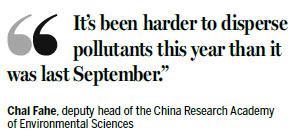Beijing issued a blue alert for air pollution, the lowest emergency response, on Thursday afternoon amid the lingering smog that has covered the capital since Wednesday.
Pollution is expected to peak on Friday at the "severe" level, the second-worst, and then ease on Saturday, when rain is forecast, the city's Environmental Protection Bureau said.
Since September, residents have seen several days with heavy smog. A yellow alert was triggered on Oct 2, a notch up from blue. Major air pollutant readings soared last month, according to data from the Ministry of Environmental Protection on Thursday.
For example, the September average reading for PM2.5 - fine particulate matter that is hazardous to human health - was 55 micrograms per cubic meter, a year-on-year increase of 10 percent.
Beijing was not alone in its sudden increase. The 338 domestic cities under regular monitoring, on average, saw PM2.5 increase by 2.9 percent year-on-year in September, Luo Yi, head of ministry's environmental monitoring bureau, said on Thursday.
Chai Fahe, deputy head of the China Research Academy of Environmental Sciences, said: "It's been harder to disperse pollutants this year than it was last September because of the weather."
But in the first three quarters, China saw significant air quality improvements, the ministry's Luo said. Average readings of major air pollutants, including PM2.5, came down a lot.
For example, in the first three quarters of the year, PM2.5 was lowered by an average of 8.5 percent year-on-year.
Moreover, about 80 percent of days in the first three quarters had air quality exceeding national standards - an increase of 2.6 percent.
In the first three quarters, cities in Hebei province, which has suffered severe air pollution since 2013, still occupied six spots in the list of 10 cities with worst air quality in the country. Xingtai was worst, the ministry said.
For the coming cold season in northern regions, experts warn that the risk of severe air pollution looms larger.
Wang Zifa, a researcher at the Institute of Atmospheric Physics under the Chinese Academy of Sciences, warned earlier that the lasting influence of the El Nino atmospheric phenomenon may trigger more - and more severe - smoggy days in winter, because of windless days and temperature inversions.

